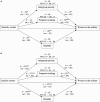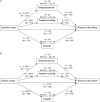Attitudes towards women in the military and their relation to both quantity and quality contact with female leaders
- PMID: 38544517
- PMCID: PMC10965798
- DOI: 10.3389/fpsyg.2024.1282835
Attitudes towards women in the military and their relation to both quantity and quality contact with female leaders
Abstract
Contact experiences with women in senior leadership roles are important for creating acceptance of women in organizations dominated by men, such as the military, as leadership roles are considered demanding, requiring numerous agentic qualities that are often ascribed to men. The military lacks women in leadership levels within its organization. We wished to determine whether quality and quantity contact with women in leadership positions reduces intergroup anxiety, increases empathy and perspective-taking, and subsequently creates more favorable attitudes toward women in the military. This was examined in three studies, one with a military sample consisting of men (n = 95), another with a civilian sample of men (n = 367), and a third study with a civilian sample of women (n = 374). Our findings revealed that quality contact was related to attitudes toward women in the military for all three samples. Results from the indirect effects tests conducted for the civilian male and female samples revealed that for civilian men, intergroup anxiety demonstrated a significant indirect effect between quantity contact and attitudes toward women in the military, while both intergroup anxiety and perspective-taking demonstrated significant indirect effects between quality contact and attitudes toward women in the military. Furthermore, both quantity and quality contact demonstrated significant direct effects. On the other hand, results revealed that for civilian women the only significant relation was the direct effect between quality contact and attitudes toward women in the military. Intergroup anxiety, perspective-taking, and empathy did not demonstrate any indirect effects for the civilian women sample. Thus, given that interactions with women in leadership positions are related to views of women in the military, research should further explore the role of contact for women in non-traditional work roles.
Keywords: attitudes toward women in the military; contact quality; contact quantity; empathy; gender roles; intergroup anxiety; perspective-taking.
Copyright © 2024 Nicol and Mayrand Nicol.
Conflict of interest statement
The authors declare that the research was conducted in the absence of any commercial or financial relationships that could be construed as a potential conflict of interest.
Figures



References
-
- Aberson C. L., Haag S. C. (2007). Contact, perspective taking, and anxiety as predictors of stereotype endorsement, explicit attitudes, and implicit attitudes. Group Process. Intergroup Relat. 10, 179–201. doi: 10.1177/1368430207074726 - DOI
-
- Allport G. W. (1954). The nature of prejudice. Reading, MA: Addison Wesley.
-
- Arbour L. (2022). Report of the Independent External Comprehensive Review of the Department of National Defence and the Canadian Armed Forces 20 May 22. Available at: https://www.canada.ca/en/department-national-defence/corporate/reports-p...
-
- Australian Government Defence (2022). Women in the Australian Defence Force (ADF) 2021–2022. Ten Years in Review. file:///C:/Users/Default.RMCLOAN/Downloads/women-in-adf-2021-22.pdf
-
- Bagci S. C., Piyale Z. E., Sen E., Yildirim O. (2019). Beyond shifting intergroup attitudes: intergroup contact’s association with socio-cognitive skills and group-based ideologies. J. Theor. Soci. Psychol. 3, 176–188. doi: 10.1002/jts5.45 - DOI
LinkOut - more resources
Full Text Sources

